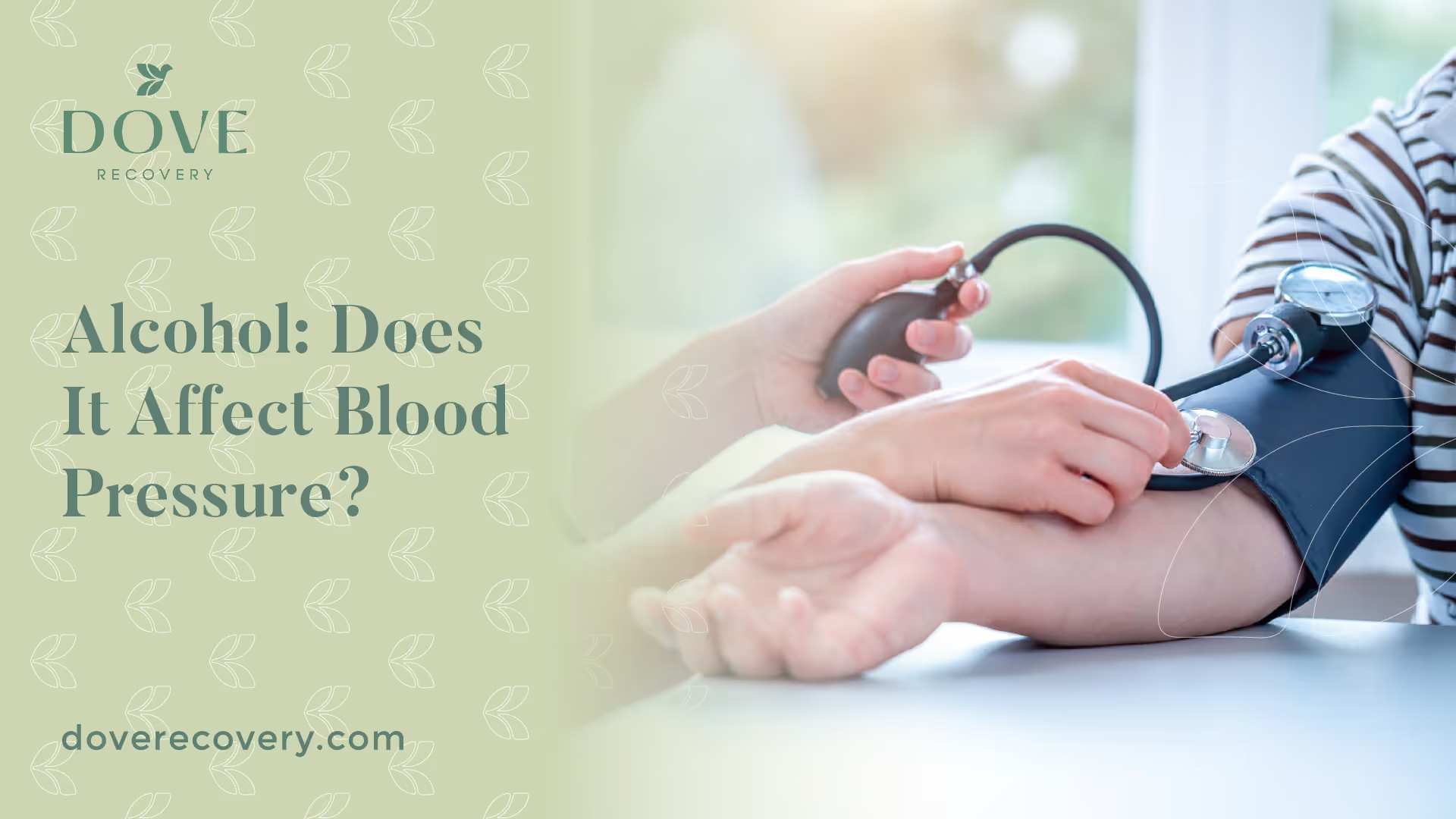Alcohol: Does It Affect Blood Pressure?

High Blood Pressure: A Growing Concern
High blood pressure, also known as hypertension, is a prevalent health issue that affects a significant number of individuals worldwide. Understanding the nature of high blood pressure and the risk factors associated with it is crucial for maintaining good health.

Understanding High Blood Pressure
High blood pressure refers to the force of blood against the walls of the arteries as the heart pumps it throughout the body. It is typically measured using two values: systolic pressure and diastolic pressure. Systolic pressure represents the force exerted on the artery walls when the heart contracts, while diastolic pressure represents the force when the heart is at rest between beats.
Normal blood pressure is generally considered to be around 120/80 mmHg (millimeters of mercury) or lower. When blood pressure consistently exceeds this range, it is classified as high blood pressure. Hypertension puts strain on the heart and blood vessels, potentially leading to serious health complications if left uncontrolled.
Risk Factors for High Blood Pressure
Several factors contribute to the development of high blood pressure. While some risk factors are beyond an individual's control, such as age and family history, others can be influenced by lifestyle choices. Common risk factors include:
- Unhealthy diet: A diet high in sodium, saturated fats, and cholesterol can contribute to high blood pressure.
- Physical inactivity: Lack of regular physical activity can increase the risk of developing hypertension.
- Obesity: Being overweight or obese puts additional strain on the heart, increasing the likelihood of high blood pressure.
- Tobacco use: Smoking or using tobacco products can raise blood pressure temporarily and damage blood vessels, increasing the risk of hypertension.
- Stress: Chronic stress can contribute to high blood pressure over time.
- Alcohol consumption: Excessive alcohol consumption can lead to an increase in blood pressure.
Understanding the risk factors associated with high blood pressure allows individuals to make informed decisions about their lifestyle choices. It's important to note that making positive changes, such as adopting a healthy diet, engaging in regular physical activity, and reducing alcohol consumption, can significantly lower the risk of developing hypertension.
By taking steps to address modifiable risk factors and making healthier choices, individuals can actively contribute to the prevention and management of high blood pressure. Regular monitoring of blood pressure, along with proper medical guidance, is essential in maintaining overall cardiovascular health.
The Link Between Alcohol and High Blood Pressure
Understanding the relationship between alcohol consumption and high blood pressure is essential for promoting overall health. Let's explore how alcohol affects blood pressure and the role it plays in hypertension.
How Alcohol Affects Blood Pressure
Alcohol consumption can have both short-term and long-term effects on blood pressure. When consumed, alcohol acts as a vasodilator, causing the blood vessels to relax and widen. This temporary relaxation can lead to a decrease in blood pressure. However, prolonged or excessive alcohol consumption can have the opposite effect.
Over time, regular alcohol intake can damage the blood vessels and interfere with the body's ability to regulate blood pressure. Chronic alcohol consumption can lead to an increase in blood pressure levels, even if it initially caused a temporary decrease. This effect is particularly significant for individuals with a predisposition to high blood pressure.
The Role of Alcohol in Hypertension
Hypertension, or high blood pressure, occurs when the force of blood against the walls of the arteries is consistently too high. It is a major risk factor for heart disease, stroke, and other serious health conditions. Alcohol consumption is recognized as an important contributor to the development and worsening of hypertension.
Excessive alcohol consumption can directly raise blood pressure levels and contribute to the development of alcohol-induced hypertension. Additionally, alcohol can interact negatively with certain blood pressure medications, reducing their effectiveness or causing adverse side effects. It is crucial for individuals taking blood pressure medications to understand the potential interactions and consult with their healthcare provider. For more information on this topic, refer to our article on alcohol and blood pressure medications.
To maintain a healthy blood pressure, it is recommended to consume alcohol in moderation, if at all. For those with hypertension or at risk of developing it, it may be best to avoid alcohol altogether. It's important to note that the relationship between alcohol consumption and blood pressure is influenced by various factors such as age, genetics, and overall health. Therefore, it is essential to consult with a healthcare professional for personalized advice based on individual circumstances.
Understanding the effects of alcohol on blood pressure is an important step in prioritizing one's health. By making informed choices and being mindful of alcohol consumption, individuals can better manage their blood pressure and reduce the risk of hypertension-related complications.
Alcohol Consumption Guidelines
When it comes to alcohol consumption and its impact on blood pressure, understanding the recommended guidelines for drinking is essential. It's important to be aware of the limits for moderate drinking and the risks associated with excessive alcohol consumption.
Recommended Limits for Moderate Drinking
Moderate drinking refers to the consumption of alcohol in a manner that is unlikely to cause harm to an individual's health. The guidelines for moderate drinking may vary slightly depending on the country, but generally, they include:
GenderMaximum Number of Drinks per DayMaximum Number of Drinks per WeekMenUp to 2 drinksUp to 14 drinksWomenUp to 1 drinkUp to 7 drinks
It's important to note that these guidelines are based on the standard definition of a drink, which typically contains around 14 grams of pure alcohol. It's also crucial to understand that even within these limits, individual tolerances and health conditions may vary. If you have specific concerns or are taking blood pressure medications, it's advisable to consult with a healthcare professional to determine the safest approach.
Risks of Excessive Alcohol Consumption
Excessive alcohol consumption can have detrimental effects on blood pressure and overall health. It's important to be aware of the risks associated with consuming alcohol beyond the recommended limits. These risks include:
- Increased Blood Pressure: Excessive alcohol consumption can lead to a sustained increase in blood pressure levels, contributing to the development of hypertension. For more information on the effects of alcohol on blood pressure, refer to our article on effects of alcohol on blood pressure.
- Cardiovascular Disease: Chronic and heavy alcohol consumption can lead to an increased risk of cardiovascular diseases, including heart attacks and strokes.
- Liver Damage: Prolonged excessive drinking can cause liver damage, including inflammation (alcoholic hepatitis), fatty liver, and cirrhosis.
- Addiction and Dependency: Regular and excessive alcohol consumption can lead to addiction and dependency, making it difficult to control or stop drinking. Seeking help for alcohol addiction is crucial for overall well-being. For more information on seeking help for alcohol addiction, visit our article on seeking help for alcohol addiction.
Understanding the recommended limits for moderate drinking and the risks associated with excessive alcohol consumption is important for maintaining a healthy lifestyle. If you have concerns about alcohol-induced hypertension or the impact of alcohol on your blood pressure, it's advisable to consult with a healthcare professional. It's essential to prioritize your health and make informed choices regarding alcohol consumption.
Factors That Influence the Relationship
While the relationship between alcohol and high blood pressure is well-established, it's important to recognize that individual differences and interactions with medications can influence this connection. Understanding these factors is crucial in navigating the potential impact of alcohol on blood pressure.
Individual Differences
Individuals may vary in their response to alcohol consumption, including its effect on blood pressure. Factors such as age, genetics, body weight, overall health, and lifestyle habits can all play a role in how alcohol affects blood pressure.
For instance, older individuals may be more susceptible to the blood pressure-raising effects of alcohol due to changes in their cardiovascular system. Similarly, individuals with a family history of hypertension may have a higher risk of developing high blood pressure in response to alcohol consumption.
Moreover, lifestyle habits such as diet, exercise, and stress management can influence the relationship between alcohol and blood pressure. Maintaining a healthy lifestyle, including regular physical activity and a balanced diet, can help mitigate the potential negative effects of alcohol on blood pressure.
Interactions with Medications
It's crucial to consider the interaction between alcohol and medications when assessing its impact on blood pressure. Certain medications used to treat hypertension or other conditions can interact with alcohol, potentially intensifying its effects on blood pressure.
Some medications, when combined with alcohol, can cause a sudden increase in blood pressure or interfere with the effectiveness of the medication. It's important to consult with a healthcare professional or pharmacist regarding the specific medications you may be taking and their potential interactions with alcohol. Our article on alcohol and blood pressure medications provides more detailed information on this topic.
Being aware of these individual differences and medication interactions can help individuals make informed decisions regarding their alcohol consumption and its potential impact on blood pressure. If you have concerns about alcohol-induced hypertension or want to learn more about the relationship between alcohol consumption and blood pressure, we recommend reading our article on alcohol-induced hypertension. It's always advisable to consult with a healthcare professional for personalized guidance based on your unique circumstances.
Strategies for Healthy Choices
When it comes to maintaining a healthy blood pressure, making conscious choices about alcohol consumption is essential. Here are some strategies to consider for promoting overall well-being:
Reducing Alcohol Consumption
Reducing alcohol consumption is a crucial step in managing high blood pressure. Moderation is key. For individuals who choose to drink alcohol, it is important to do so in moderation. The recommended limits for moderate drinking vary depending on factors such as gender and age. Generally, moderate drinking is defined as up to one drink per day for women and up to two drinks per day for men.
By reducing alcohol consumption, individuals can help lower their blood pressure and reduce the risk of alcohol-induced hypertension. It's important to note that excessive alcohol consumption can lead to various health issues, including high blood pressure.
Alternative Beverages to Consider
For those looking to reduce or eliminate alcohol consumption altogether, there are plenty of alternative beverages to consider. Hydration is key for maintaining good health, and choosing non-alcoholic options can provide a refreshing alternative. Some options to consider include:
- Water: Staying hydrated with water is essential for overall health and can help regulate blood pressure.
- Herbal Tea: Herbal teas are caffeine-free and can provide a soothing and enjoyable beverage option.
- Fruit Infused Water: Infusing water with fruits like berries, citrus, or cucumber can add flavor without the need for alcohol.
By exploring these alternatives, individuals can find enjoyable beverages that promote hydration and overall well-being.
Seeking Help for Alcohol Addiction
For individuals struggling with alcohol addiction, seeking help is crucial for both their overall health and managing high blood pressure. Support from healthcare professionals, counselors, or support groups can provide the necessary guidance and resources for overcoming addiction. Addressing alcohol addiction can significantly improve blood pressure control and overall health.
If you are concerned about your alcohol consumption or suspect that you may have an addiction, it is important to reach out for professional help. Organizations such as Alcoholics Anonymous (AA) and treatment centers can offer support and guidance on the path to recovery. For more information on seeking help for alcohol addiction, visit our article on drinking alcohol and blood pressure.
Conclusion
By reducing alcohol consumption, exploring alternative beverages, and seeking help when needed, individuals can take proactive steps towards maintaining a healthy blood pressure and overall well-being. Remember, it's important to consult with healthcare professionals for personalized advice and guidance regarding alcohol consumption and its impact on blood pressure, especially if you are taking blood pressure medications.
Sources:
- https://www.ncbi.nlm.nih.gov/pmc/articles/PMC8130994/#:~:text=Heart%20rate%20increased%20significantly%20after,within%2024%20hours%20of%20consumption.
- https://www.heart.org/en/health-topics/high-blood-pressure/changes-you-can-make-to-manage-high-blood-pressure/limiting-alcohol-to-manage-high-blood-pressure
- https://www.medicalnewstoday.com/articles/alcohol-and-blood-pressure
